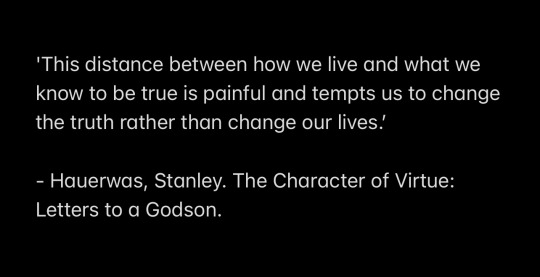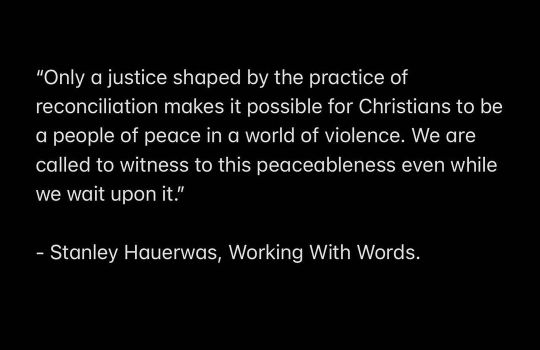#stanley hauerwas
Text
Jesus is Lord, and everything else is bullshit.
Stanley Hauerwas
17 notes
·
View notes
Photo

“As far as I am concerned it is never a question if God exists. The question is whether and how we should exist.”
—Stanley Hauerwas
15 notes
·
View notes
Text
“The Enlightenment not only helped us to discover the Atom bomb but also gave us the intellectual means to use it without great guilt.”
- Stanley Hauerwas and William H Willimon, ‘Resident Aliens’, pg.100
1 note
·
View note
Text
The Prayer Jesus Taught: “And lead us not into temptation, but deliver us from evil”
On March 26, 2023, Rev. Dr. Tim Hart-Andersen, the Senior Pastor at Minneapolis’ Westminster Presbyterian Church, delivered the last of his five sermons on different passages of the Lord’s Prayer.[1] This sermon was on the following portion of the third sentence (in bold) of that Prayer:
“Our Father, who art in heaven, hallowed be thy name. Thy kingdom come, thy will be done, on earth as it is…
View On WordPress
#evil#Garden of Gethsemane#John Dominic Crossan#Mary Oliver#Minneapolis Westminster Presbyterian Church#Pope Francis#Psalm 46#Rev. Dr. Timothy Hart-Andersen#Stanley Hauerwas#temptation#The Lord&039;s Prayer
0 notes
Text

'This distance between how we live and what we know to be true is painful and tempts us to change the truth rather than change our lives.’
- Hauerwas, Stanley. The Character of Virtue: Letters to a Godson.
1 note
·
View note
Text
Other Words: Four More Cries from the Cross
The last word my mother ever spoke to me was “No.” She spoke it repeatedly as she lay in a hospital bed. Her cry was a spontaneous act of resistance, an expression of outrage against the impending dissolution of death. The last thing my father said to me was, “I love you.” He, too, was in a hospital bed, and his words were also a reflex of sorts. Despite his discomfort, it was an automatic…

View On WordPress
#Crucifixion#death#Easter#Good Friday#Hauerwas#Holy Week#Seven Last Words of Christ#Stanley Hauerwas
0 notes
Text
Dear brothers and sisters,
This week, we are called to reflect on the words of the prophet Isaiah and their significance for our lives as Christians. In the spirit of Stanley Hauerwas, let us consider the way in which these ancient words continue to challenge and shape us today, especially in light of the recent rise in gun violence.
As we read the words of Isaiah, we are struck by the prophetic voice calling out to a people who have lost their way, who have forgotten the God who saved them. We are reminded that the prophetic tradition is not just about predicting the future, but about speaking truth to power in the present.
In the spirit of Hauerwas, we must remember that the prophetic tradition calls us to a life of faithful obedience, even in the face of great opposition. We are called to live lives that embody the truth of the gospel, and to be a witness to the world around us of the power of God's love and grace.
Karl Barth, one of the great theologians of the 20th century, reminds us that true obedience is rooted in a deep sense of God's grace. Through faith in Jesus Christ, we are saved not by our own works, but by the free gift of God's love. In this light, we might hear in Isaiah's words a call to trust in God's steadfast love, even when the world around us seems to be collapsing, as in the recent rise of gun violence.
Just as the people of Israel were called to live in the truth of God's grace, so too are we called to live in the truth of God's grace today. We are called to trust in God's promises, and to live lives that reflect the reality of God's grace. This includes speaking out against the evil of gun violence and working for peace and justice in our communities.
Similarly, Flemming Rutledge reminds us that the prophetic tradition is not just about individual piety, but about participating in God's mission of justice and healing in the world. In this light, we might hear in Isaiah's words a call to work for the common good, to stand in solidarity with the marginalized and oppressed, including the victims of gun violence, and to embody the transformative love of God in all that we do.
So let us be encouraged this week by the words of the prophet Isaiah, and let us commit ourselves anew to living lives of faithful obedience to God. May we be strengthened by the grace of our Lord Jesus Christ, and may we be empowered to participate in God's mission of justice and healing in the world, especially in the face of the recent rise in gun violence.
As we listen to the voice of the prophet, let us remember that we too are called to be prophets, called to speak truth to power, and called to live lives of faithful obedience to God. May we have the courage to live out this calling, and may we be a witness to the grace and love of our Lord Jesus Christ. Amen."
0 notes
Quote
Good Christians get to run for office once. If they do the right thing they won’t be re-elected.
Stanley Hauerwas
8 notes
·
View notes
Text
context? In theory, the Christian Church could be an antidote to all that. What is more needed in our time than a community marked by sincere love, sharing what they have from each according to their ability and to each according to their need, eating together regularly, generously serving neighbors, and living lives of quiet virtue and prayer? A healthy church can be a safety net in the harsh American economy by offering its members material assistance in times of need: meals after a baby is born, money for rent after a layoff. Perhaps more important, it reminds people that their identity is not in their job or how much money they make; they are children of God, loved and protected and infinitely valuable.
But a vibrant, life-giving church requires more, not less, time and energy from its members. It asks people to prioritize one another over our career, to prioritize prayer and time reading scripture over accomplishment. This may seem like a tough sell in an era of dechurching. If people are already leaving—especially if they are leaving because they feel too busy and burned out to attend church regularly—why would they want to be part of a church that asks so much of them?
Although understandable, that isn’t quite the right question. The problem in front of us is not that we have a healthy, sustainable society that doesn’t have room for church. The problem is that many Americans have adopted a way of life that has left us lonely, anxious, and uncertain of how to live in community with other people.
The tragedy of American churches is that they have been so caught up in this same world that we now find they have nothing to offer these suffering people that can’t be more easily found somewhere else. American churches have too often been content to function as a kind of vaguely spiritual NGO, an organization of detached individuals who meet together for religious services that inspire them, provide practical life advice, or offer positive emotional experiences. Too often it has not been a community that through its preaching and living bears witness to another way to live.
The theologian Stanley Hauerwas captured the problem well when he said that “pastoral care has become obsessed with the personal wounds of people in advanced industrial societies who have discovered that their lives lack meaning.” The difficulty is that many of the wounds and aches provoked by our current order aren’t of a sort that can be managed or life-hacked away. They are resolved only by changing one’s life, by becoming a radically different sort of person belonging to a radically different sort of community.
2 notes
·
View notes
Text
Exploring History
I have been trying to understand better the upsurge in adoption of "White-Christian nationalism. I believe that freedom of and from religion are public goods. I am not a very good Christian, but I know there is a long tradition of Christians arguing for the separation of Church and state. So was inteerested in pursuing that topic a little.
I knew that the presiding bishop of the Episcopal Church supports the effort Christians Against Christian Nationalism.That Web site was the beginning of a rabbit hole adventure. I was curious about how the current bishop, Micheal Curry fit among the preceding presiding bishops.
The eighth presiding bishop of the Episcopal Church was John Henry Hopkins. I had never heard of him before, but seeing his picture was enough to make me curious. It turns out that he was an important figure in history locally to where I live now. Reading about his life informed me about aspects of local history I wasn't aware and filled me with curiosity about other connections. One aspect of Hopkins's remarkable life was that he defended slavery.
The first and fourth presiding bishop was William White, who I also knew little about. I had known that Samuel Seabury the second presiding bishop was the first American bishop ordained. The head of the Church of England is the King or Queen, so American independence made ordination of American bishops a bit of a problem. What I had not known was that Seabury was a slaveholder.
In 1795 Bishop White ordained Absalom Jones as a deacon and as a priest in 1802. I was ignorant of Absalon Jones and the history of the African Episcopal Church of Saint Thomas the first Black church in Philadelphia.
Attending an Episcopal school in Greenville, South Carolina in the 1960's, Sewanee, The University of the South held prominence. I have never been there, but know of the abiding affection for the place and institution. I saw an essay about John Henry Hopkins at a blog from the University of the South, The essay was part of The Roberson Project On Slavery, Race and Reconciliation. The project was named for Sewanne's first tenured Black professor, Houston Robertson. The aim is from knowing history "to seek a more just and equitable future."
I really enjoyed how curiosity about John Henry Hopkins connected history to institutions and place connected to my personal history.
On the more general quest to better understand and respond to the rise of White Christian Nationalism I was reading about a book by Stanley Hauerwas and William H. Willimon, entitled Resident Aliens. I didn't know anything about William Willimon and poking around a bit noticed one of his books is Who Lynched Willie Earle?: Preaching to Confront Racism. I knew Willie Earle was a man lynched in Greenville. It turns out that Willimon is a native of Greenville and his book recounts how a Methodist minister, Hawley Lynn, responded to the lynching. I haven't read Willimon's book, but I was inspired reading about Hawley Lynn.
My casual inquiry into the history of the denomination I grew up in was made meaningful by people and places which already familiar., but I hadn't noticed before how race and racism were at the core from the beginning. It's very hard to bury history nowadays. The encouraging thing is how some White Christians are engaging with history with a sense towards how history obligates actions to encourage better futures.
6 notes
·
View notes
Text
Good Friday Reflection 2024
This morning I put on a bracelet with a cross on it.
It’s Good Friday.
It’s only called “Good” Friday because in the end God died the death of death so that sinners like you and me may live.
Writing on the The Fourth Word from the cross, “My God, My God, Why have you forsaken me?” American theologian Stanley Hauerwas says that we are to know “that the Son of God has taken our place, become for…
View On WordPress
0 notes
Text
Gentleness is given to those who have learned that God will not have his kingdom triumph through the violence of the world, for such a triumph came through the meekness of a cross.
Stanley Hauerwas, Hannah's Child: A Theologian's Memoir
176 notes
·
View notes
Text
0 notes
Text
* 하나님의 나그네 된 백성
저자 : 스탠리 하우어워스
- 스탠리 하우어워스(Stanley Hauerwas, 1940년 6월-)는 성공회 신학자이자 기독교 윤리학자이다. 사우스웨스턴 대학교를 나온 뒤 예일 대학교 신학대학원에서 신학과 윤리학을 공부해 석사, 박사 학위를 받았다. 노틀담 대학교를 거쳐 듀크 대학교 신학부에서 2013년까지 신학과 윤리학을 가르쳤다. 2000-1년에는 기포드 강연을 했으며 2014년에는 애버딘 대학교의 신학적 윤리학 교수가 되었다. 20세기 후반 대표적인 미국 신학자로 꼽히며 그리스도교 근본주의, 자유주의적 그리스도교에 모두 비판적인 노선에 서 있다. 이야기 신학(narrative theology)과 후기 자유주의신학(postliberal theology)의 영향 아래 기독교 평화주의, 공공 윤리, 정치신학, 철학적 신학 분야에서 다양한 저작을 남겼다.
- 스탠리 하우어워스는 전쟁을 비롯한 모든 폭력을 죄로 규정하여 반대하는 기독교 평화주의를 주장한다. 그 실례로 스탠리 하우어워스는 윌리엄 헨리 윌리몬 감리교 감독과 같이 쓴 《십계명》에서 기독교계에 기도를 부탁함으로써 진보적인 지식인들로부터 인도주의적 제국주의, 종교적 제국주의 전쟁이라는 비평을 받은 이라크 전쟁을 하느님의 뜻에 의한 전쟁이라는 종교적 논리로 정당화하려고 한 감리교도 조지 부시에 대해 하느님의 이름을 함부로 부르는 신성모독자라고 비판하였으며[3],이라크에 파병된 군인들을 위한 기도문을 작성함으로써 이라크 전쟁에 동조한 기독교 우파들에 대해서도 잘못된 전례(Liturgy)는 잘못된 윤리를 낳는다고 비판함으로써,미국 보수 기독교계의 폭력성과 부도덕함을 신랄하게 비판한다.
- "나는 기독교 신학자다. 사람들은 내가 그런 질문에 답할 수 있을 거라고 생각한다. 그러나 나는 그런 질문에 어떻게 대답해야 할지 모른다. (중략) 그러나 내가 볼 때, 그리스도인으로 사는 것은 답 없이 사는 법을 배우는 과정이다. 이렇게 사는 법을 배울 때 그리스도인으로 사는 것은 너무나 멋진 일이 된다. 신앙은 답을 모른 채 계속 나아가는 법을 배우는 일이다." (하나의 아이 375쪽)
—— 책 요약과 질문
1. 변한 세상
- 콘스탄틴누스식으로 교회와 세상을 하나로 묶었던 낡은 통합은 힘을 잃게 되었다.
Q: 변한 세상에서 더 이상 작동하지 않는 옛신학과 옛관습들은 어떤 것들이 있나?
Q: 변한 세상에서 그리스도인과 교회는 저항/타협/진보의 분별과 실천을 어떻게 해 나가야 하는가?
2. 올바른 신학적 질문들
- 설교자란, 고대의 낡은 세상인 성서와 새롭고 실제적인 세상인 현대 사이에 가로놓인 넓고 깊은 공백을 영웅적으로(예언자적으로) 연결하는 사람이다.
Q: 나는 어떤 설교자(메신저)인가? 어떤 설교자이고 싶은가?
3. 새로운 이해인가, 새로운 삶인가
- 바르게 산다는 것은 바르게 생각하는 것이라기보다는 도전하는 삶이라고 할 수 있다. 이 도전은 지적인 것이 아니라 정치적인 것이다. 즉, 그리스도로 말미암아 세상에 일어난 큰 변화에 동조해 사는 새 백성을 세우는 것이다.
Q: 정치적으로 도전하고 산다는 것은 무엇인가?
Q: 그리스도인과 교회는 세상의 정치적 과제에 어떤 메시지를 던져야 하는가?
4. 불신앙의 정치
- 세속적 휴머니즘에 맞서기 위해 공립학교에서 기도소리가 울려 펴져야 한다고 주장한다. 이런 식의 사고들은 콘스탄틴주의의 한 ���태일 뿐이며, 역설적이게도 불신앙의 문화를 승인하는 것이다.
Q: 한국 기독교에서 발견할 수 있는 불신앙의 정치는 무엇인가?
Q: 그것들은 어디에서 비롯됐는가?
5. 사회 전략인 교회
- 나치 독일 때, 교회는 너무나 자발적으로 “세상에 봉사”했다. 나치즘 앞에 교회가 굴복한 것이다. 그러나 그때에 해야 할 일이 무엇인지는 정확히 몰랐어도, 최소한 참된 것을 말해야 한다는 소명을 품었던 사람들이 있다. 바로 고백교회였다.
(1) 행동주의 교회 - 교회 개혁 보다는 좀 더 나은 사회를 건설하는 일에 관심을 기울인다. 사회 구조를 인간화함으로써 하나님께 영광을 돌린다
(2) 회심주의 교회 - 개인 영혼에 초점을 맞추며, 오직 내적인 변화만을 위해 일하기 때문에 세상에게 나누어 줄 수 있는 자체의 사회 구조라든가 개인적인 사회 윤리를 가지고 있지 못하다.
(3) 고백교회 - 개인의 정신을 바꾸거나 사회를 변혁하는 데 있는 것이 아니라, 회중으로 하여금 만물 안에 계시는 그리스도를 예배하도록 결단케 하는 데 힘쓴다. 고백교회가 말하는 회심이란, 세례를 받아 새로운 백성, 즉 대안적인 폴리스이자 교회라 불리는 대항문화적인 사회 조직체에 접붙여지는 긴 과정을 의미한다.
Q: 우리 교회는 어떤 지향성을 가지고 있는가?
Q: 몰락해 가는 한국 교회의 회복을 위해 싸워야 할 것들은 무엇인가?
결론 : 성경은 일차적으로 한 백성이 하나님과 함께하는 여행에 관한 이야기이다. 성서는 하나님께서 들려주신 인간 실존에 관한 기록이다. 성경 속에서 우리는 하나님께서 우리 삶의 조각난 부분들을 모으시고 그것들을 하나로 묶어서 무엇인가 의미를 지니는 일관된 이야기로 만드시는 것을 본다. 흥미롭게도 초대 그리스도인들은 성육신의 형이상학에 관한 교리적 사변으로, 즉 복음서 기사에서 추론된 기독론으로 시작하지 않았다. 그들은 예수에 관한 이야기와 그의 삶에 매혹되어 살았던 사람들의 이야기로 시작했다. 그리하여 복음서 저자들은 그들이 몸소 실천한 삶의 모습을 기준으로 삼고 훨씬 더 복잡하고 매력적인 방식을 사용해 우리가 예수를 본받는 삶을 살아가도록 훈련할 수 있었다. 우리는 예수를 따르지 않고서는 그를 알 수 없다.
Q: 나는 성경을 어떻게 읽고 있는가?
Q: 성경읽기의 진보를 위해 필요한 것은 무엇인가?
Q: 나는 예수를 어떻게 따르고 있나?
0 notes
Photo

“Only a justice shaped by the practice of reconciliation makes it possible for Christians to be a people of peace in a world of violence. We are called to witness to this peaceableness even while we wait upon it.” - Stanley Hauerwas, Working With Words. (at Wesley House, Cambridge) https://www.instagram.com/p/ClNomXMtM6s/?igshid=NGJjMDIxMWI=
5 notes
·
View notes